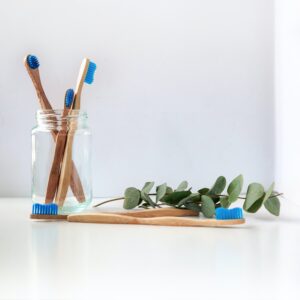Choosing between soft and hard-bristled toothbrushes is a challenge for many as they both have unique perks. Picking just anyone is by no means a good idea, as it may not be able to address your oral care needs. Just like other oral care products toothbrushes are available in different varieties, in this case, firmness levels. This gives users the freedom to choose the one that best suits them.
If you are like most people, you may be unable to tell which is best for you even after using it. If you are in this boat, then you need to learn everything from the perks to the unique features of a hard and a soft-bristle toothbrush. This article contains the intricate information you need to make an informed decision, as it sheds light on everything you need to know about the perks and downsides of soft and hard-bristle toothbrushes.

Hard-bristled toothbrushes- Under the microscope
A hard-bristled bamboo toothbrush may seem like the perfect option for you, especially if you want to keep your mouth clean. Since it has extra-firm bristles, you may conclude that it is more effective at removing plaque than soft bristle toothbrushes. While this is somewhat true, it is worth noting that toothbrushes with hard bristles can wear the enamel and damage your gum. As pointed out by dental care experts it is better to opt for professional dental cleaning (once or twice yearly) than to use a hard brush.
Pros of using hard-bristled toothbrushes
- They last longer than soft bristle toothbrushes (This means that they will remain in great shape and remove plaque effectively during the period you use them)
- They are effective and can remove food remains better than their soft bristle counterpart
Cons of using hard-bristled toothbrushes
- They can wear away the enamel. The enamel is the top and protective layer of the teeth. When it is damaged, more bacteria will stick to the teeth and cause oral conditions like tooth decay.
- A hard bristle toothbrush can also damage the gum and cause the gum line to start receding. When this happens, your teeth will become more vulnerable to some dental conditions.
A close look at Soft-bristled toothbrushes
Dentists usually recommend toothbrushes with soft bristles for two main reasons. First, they are effective at removing plaque and food remains. Also, they are gentle on the teeth and don’t damage the enamel and the gum. To get the most out of a soft bristle toothbrush, you have to use the right brushing technique.
Pros of using toothbrushes with soft bristles
- They can effectively remove food remains and debris from the teeth
- They are gentle on the gum and teeth. So they are less likely to damage the enamel and gum.
Cons of toothbrushes with soft bristles
- While soft-bristled toothbrushes may seem perfect, it is worth noting that they aren’t for everyone.
- You need to learn good brushing techniques to get the most out of them.
Soft Vs Hard-Bristled toothbrushes- Which is better?
As mentioned above hard and soft-bristled toothbrushes have their perks and downsides. If you are most people, you will enjoy using a toothbrush with soft bristles. However, if you don’t feel comfortable using it, then you should try a hard-bristle toothbrush. Make sure you don’t exert too much pressure when brushing your teeth with it so that you don’t damage your enamel and gum.
Final Note
Whether you choose a hard or a soft bristle bamboo toothbrush, you should ensure that you use it twice daily and change it after 3 months of use.
Remember that it isn’t always the best option to opt for an extra firm bristled toothbrush to clean your teeth. The downsides of using them outweigh their pros. Having your teeth cleaned professionally is a way better and safer option.

